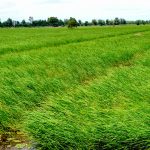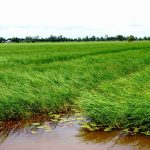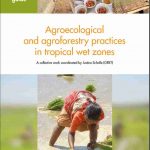8 downloads
Title of document: How to improve yield crop in Organic Farming? “A case study of Vegetable and Rice crop on poor acid sandy soil of Angkor Heritage world” Authors: Dr Tan Boun Suy Journal’s name if any: Ministry/Government Agency/Organisation: APSARA National Authority Year of publication: Geographic focus: Cambodia Main issues / topics addressed (for example: Comparison of the effects of Chromolaena odorata and Cassia siamensis on Rice crops, Comparison of the effect of natural Fertilizers and chemical Fertilizer on green cabbage……) School of agroecology (if any): Web address to original document (if any): Summary: Compost is the basic natural fertilizer in Organic Farming. It brings beneficial microorganisms resulting in good health of plant. But nutrients released is very low comparing with chemical fertilizer This presentation talking about comparison of the effect of natural Fertilizers and chemical Fertilizer on poor acid sandy soil of Angkor Heritage world. Read More
6 downloads
Title of document: National Multi Stakeholder Workshop “Towards an Agroecology Transition” (Improving soil fertility, rice productivity and fodder resources in the lowlands rice of Cambodia: a complex trade-off) Authors: Rada Kong, Vira Leng, Sopheak Trang, Veng Sar, Yosei Oikawa, Sovannara Chheong, Florent Tiveta, Sonoko D. B. Kimura, and Stéphane Boulakia Journal’s name if any: Ministry/Government Agency/Organisation: AFC, ACTAE, CIRARD, ALiSEA, CANSEA Year of publication: 2016 Geographic focus: Cambodia Main issues / topics addressed (for example: Briefs on rice production systems in Cambodia, Conservation Agriculture (CA) for lowland rice, Results of experiments and demonstration……) School of agroecology (if any): Web address to original document (if any): Summary: This presentation talking about Results of experiments and demonstration of Conservation Agriculture (CA) for lowland rice. At National Multi Stakeholder Workshop “Towards an Agroecology Transition”, Phnom Penh, November 30-31, 2016 Read More
5 downloads
Title of document: Proceedings of the National Workshop on Agroecological Transition 30th and 31st March 2016, Phnom Penh, Cambodia Authors: Lucie Reynaud, Pierre Ferrand and Dr. Saythong Vilayvong Journal’s name if any: Ministry/Government Agency/Organisation: AFC, GRET/ALiSEA, CIRAD, ACTAE Year of publication: 2016 Geographic focus: Cambodia Main issues / topics addressed (for example: Day1: Setting the stage, Day 2: Working groups and brainstorming about agriculture challenges and a future governance for ALiSEA ……) School of agroecology (if any): Web address to original document (if any): Summary: The 1st national multi-stakeholder workshop addressing Agroecological Transition in the Mekong Region, and more especially in Cambodia, was held on the 30th and 31st of March 2016 in Phnom Penh. It was organized by CIRAD and GRET as part of the inception phase of ACTAE project, funded by the French Agency for Development (AFD). It brought together 66 specialists and practitioners from national and international NGOs, research, farmers’ and consumers’ associations, government agencies, development partners and private sector actively working on sustainable agriculture sector in Cambodia It aimed at sharing knowledge, information and experiences between agricultural development stakeholders Read More
4 downloads
Title of document: National multi-stakeholder workshop “Towards an Agro-ecological Transition”: ADG experience on promoting agroecology Authors: Mrs. IM Sothy Journal’s name if any: Ministry/Government Agency/Organisation: ACTAE, ADG Year of publication: 2016 Geographic focus: Cambodia Main issues / topics addressed (for example: What is ADG?, Agro-ecology target areas, Main AE productions……) School of agroecology (if any): Web address to original document (if any): Summary: Aide au Développement Gembloux (ADG): Belgian NGO based at Gembloux Agro-bio Tech/ULg and active in the agricultural sector in Cambodia since 2001 This presentation of Aide au Développement Gembloux (ADG) for experience on promoting agroecology, at National multi-stakeholder workshop “Towards an Agro-ecological Transition” on 30-31 March 2016, Cambodia Read More
6 downloads
Title of document: Proceedings of the regional workshop: Towards a regional initiative to develop E-learning resources in Agroecology - Phnom Penh, Cambodia, 11th of October 2017 Authors: Florent Tivet Ministry/Government Agency/Organisation: ACTAE/CIRAD_GRET Year of publication: 2017 Geographic focus: Mekong Region Summary: Based on on-going activities in the field of training and higher education implemented by a range of partners within ACTAE project and beyond (see program of the event) a regional workshop was organized in Phnom Penh on October 11 2017 bringing together different partners involved in training, awareness raising and higher education. This workshop was organized on the continuity of a 1st event organized by ALISEA in Vientiane in June 2017. A diversity of participants attend the event with representatives from several universities in the region (Thailand, Lao PDR, Cambodia, Myanmar), research institutions, representatives from Ministry of Agriculture, departments of Agricultural Land Resources Management, and NGOs. The first focus of the event was on e-learning as an integrated tool between different actors and beneficiaries. Discussions were conducted prior the event one between ITC, SupAgro, RUA, Queensland University, GDA/DALRM, GRET and CIRAD to identify common expectations for this event and outputs. Read More

20 downloads
Title of document: Presentations from the Regional Forum on Promoting Sustainable Agriculture in the Mekong Sub-Region towards Food Security, An Giang University, Vietnam 6-7 November 2017 Authors: Ministry/Government Agency/Organisation: An Giang University, ALiSEA, SEARCA Year of publication: 2017 Geographic focus: Mekong Region Summary: The Mekong Sub-region is rapidly becoming a new frontier of economic growth in Southeast Asia due to its rich human and natural capital (ADB 2017). Its suitability for a wide range of crops has made agriculture one of the sub-region’s important economic sectors. It has also led to increased trade and investment linked to regional integration. More than two-thirds of the population of the countries comprising the Mekong Sub-region rely heavily on agriculture for their livelihoods (WWF Greater Mekong). These countries are Cambodia, the Lao People's Democratic Republic (Lao PDR), Myanmar, Thailand, and Vietnam. The People's Republic of China (Yunnan Province) is a part of this sub-region but for purposes of this forum is not included. The forum aimed to share research findings from SEARCA SFRT grantees across the Mekong Sub-Region, as well as develop research to address gaps, towards the promotion of ecological farming, adaptation to climate change, and improving rural livelihoods and food security. This forum covered Seed Fund for Research and Training (SFRT) research from 2013 to 2016 where 11 out of 15 studies of Vietnamese and Myanmar grantees are relevant to the above subject (none from Cambodia, Lao PDR, and Thailand for the period). The expected participants were selected local researchers from universities in Vietnam, particularly in the Mekong Delta, SFRT grantees and SEARCA Fellows/scholarship alumni from Cambodia, Lao PDR, Myanmar, Vietnam and Thailand. It also featured research conducted by the Research Center for Rural Development (RCRD) of An Giang University under the project component Agroecology Learning Alliance in South East Asia (ALiSEA). The ALiSEA component supports activities aimed at increasing visibility and credibility of the agroecology movement, and scaling up the development and adoption of agroecological practices among farmers. Here are the presentations of the Seed Fund for Research and Training (SFRT) research from 2013 to 2016: Assessment of Impacts of and Adaptation to CC in Fisheries and Agriculture - Mac Nhu Binh Assessment of the Impact of CC to Aquaculture Fisheries Household - NTHDiep Assessment of Traditional Rice Based Farming Systems - LT Phong Climate Change Impact on Rice Production and Adaptation - Huynh Viet Khai Enhancing Marketing Capacity for Agriculture Cooperatives - QTXuan Gender roles and relationship in water management - Nguye Van Thai Impact of Rural Out-migration on the Resilience of Agricultural - Seinn Seinn Mu Promoting Sustainable Agriculture in the Mekong Sub-Region_ Ngo Thanh Son Read More

18 downloads
Title of document: Presentations from the Regional Forum on Promoting Sustainable Agriculture in the Mekong Sub-Region towards Food Security, An Giang University, Vietnam 6-7 November 2017 Authors: Ministry/Government Agency/Organisation: An Giang University, ALiSEA, SEARCA Year of publication: 2017 Geographic focus: Mekong Region Summary: The Mekong Sub-region is rapidly becoming a new frontier of economic growth in Southeast Asia due to its rich human and natural capital (ADB 2017). Its suitability for a wide range of crops has made agriculture one of the sub-region’s important economic sectors. It has also led to increased trade and investment linked to regional integration. More than two-thirds of the population of the countries comprising the Mekong Sub-region rely heavily on agriculture for their livelihoods (WWF Greater Mekong). These countries are Cambodia, the Lao People's Democratic Republic (Lao PDR), Myanmar, Thailand, and Vietnam. The People's Republic of China (Yunnan Province) is a part of this sub-region but for purposes of this forum is not included. The forum aimed to share research findings from SEARCA SFRT grantees across the Mekong Sub-Region, as well as develop research to address gaps, towards the promotion of ecological farming, adaptation to climate change, and improving rural livelihoods and food security. This forum covered Seed Fund for Research and Training (SFRT) research from 2013 to 2016 where 11 out of 15 studies of Vietnamese and Myanmar grantees are relevant to the above subject (none from Cambodia, Lao PDR, and Thailand for the period). The expected participants were selected local researchers from universities in Vietnam, particularly in the Mekong Delta, SFRT grantees and SEARCA Fellows/scholarship alumni from Cambodia, Lao PDR, Myanmar, Vietnam and Thailand. It also featured research conducted by the Research Center for Rural Development (RCRD) of An Giang University under the project component Agroecology Learning Alliance in South East Asia (ALiSEA). The ALiSEA component supports activities aimed at increasing visibility and credibility of the agroecology movement, and scaling up the development and adoption of agroecological practices among farmers. Here are the presentations of the plenary session: Development potentials for floating rice cultivation in Ayeyarwady Delta Region, Myanmar - Nilar Aung Integrating collaborative co-designed research and citizen sciences for conservation of floating rice in the Mekong Region, Vietnam - Dr. N V Kien Sarus crane, an indicator of sustainable agriculture in the Ayeyarwady Delta, Myanmar - Tran Triet Scoping Floating rice based agro-ecological farming system, Myanmar - Dr Thein Tun Trade-offs between ecosystems services in rice cropping system, Cambodia - Dr Malyne Neang Read More
5 downloads
Title of document: Dynamics of Soil Carbon, Nitrogen and Soil Respiration in Famer’s Field with Conservation Agriculture, Siem Reap, Cambodia Authors: Don Immanuel A. Edralin, Gilbert C. Sigua and Manuel R. Reyes Journal’s name if any: International Journal of Plant & Soil Science Ministry/Government Agency/Organisation: North Carolina Agricultural and Technical State University, Greensboro, NC, USA; United States Department of Agriculture, Agricultural Research Service, Coastal Plains Soil, Water, and Plant Research Center, Florence, SC, USA. Year of publication: 2016 Geographic focus: National level Main issues / topics addressed (for example: No tillage; conventional tillage; soil organic carbon; soil quality index; cover crops.…) School of agroecology (if any): Web address to original document (if any): Summary: The years of intensive tillage in many countries, including Cambodia have caused significant decline in agriculture’s natural resources that could threaten the future of agricultural production and sustainability worldwide. Long-term tillage system and site-specific crop management can affect changes in soil properties and processes, so there is a critical need for a better and comprehensive process-level understanding of differential effects of tillage systems and crop management on the direction and magnitude of changes in soil carbon storage and other soil properties. A study was conducted in farmer’s field to evaluate the effect of conservation agriculture (CA) and conventional tillage (CT) on soil carbon, nitrogen and soil respiration in three villages of Siem Reap, Cambodia. Soil organic carbon (p≤0.01), soil total nitrogen (p≤0.01) and soil respiration (p≤0.10) for at least in two villages were significantly affected by tillage management. The soil quality was improved in villages with CA compared with villages with CT by increasing soil organic carbon (10.2 to 13.3 Mg ha-1) and soil nitrogen (0.87 to 1.11 Mg ha-1) because of much higher soil moisture (15.7±8.6 to 20.0±11.9%) retained in CA and with reduced soil temperature (30.4±2.0 to 32.4±2.3°C) during the dry period. Additionally, field soil respiration was higher in CA (55.9±4.8 kg CO2-C ha-1 day-1) than in CT (36.2±13.5 kg CO2-C ha-1 day-1), which indicates more microbial activity and increased mineralization of soil organic carbon for nutrient release. The soil’s functions of supporting plant growth and sink of carbon and recycler of nutrients was likely improved in agroecosystem with CA than in system with CT. Our results have suggested that CA may have had enhanced soils’ carbon and nitrogen contents, nutrient supplying capacity and microclimate for soil microorganisms in three villages with vegetable production. Read More

56 downloads
Title of document: Agroecological and agroforestry practices in tropical wet zones Authors: A collective work coordinated by Justine Scholle (GRET) Ministry/Government Agency/Organisation: GRET Year of publication: 2017 Geographic focus: Mekong Region and Central Africa Summary: This guide is designed as a support tool for technicians and farmers involved in actions to promote and develop agroecology. It is a follow-up to a first technical guide published in 2014 in the Democratic Republic of Congo as part of the DEFIV project, a food security project implemented by GRET, funded by the European Union and Agence française de développement. This guide features two parts: The first part presents the current context and issues of agroecology in tropical wet regions. Having demonstrated the limits of conventional agricultural systems, analysed the effects of deforestation, the green revolution and climate change, the authors specify the objectives and the principles of agroecology, and remind readers of the conditions necessary to promote it. The second part is very operational and covers the various agroecological techniques, which were tested in a tropical wet context with satisfying results in the Democratic Republic of Congo (DEFIV project), Cambodia (APICI project) and Myanmar (Delta and NRS projects). Firstly, the various agroecological techniques are presented, and secondly the plants used to implement these techniques are described. Naturally, techniques such as plant inventories mentioned in this guide are not exhaustive. Read More
18 downloads
Title of document: Stories From The Field - Women working toward a non-toxic environment Author: Ilang Ilang Quijano et al. on behalf of Towards a Non-toxic Southeast Asia Date of publication: 2016 Geographical focus: Cambodge, China, Laos, Thailand, Vietnam Summary: The often unseen but disastrous consequences of chemical-intensive food and agricultural production are felt most by half of the world’s food producers and rural population: women. On the average, women make up about 43 percent of the agricultural labour force in developing countries, according to the Food and Agriculture Organization (FAO). Women are involved in all stages of food production—everything from seed collection, land preparation, fertilizer and pesticides application, weeding, harvesting and storage, food processing, and livestock rearing. In addition, they are also responsible for most household and child-rearing activities. This booklet contains a collection of stories of 25 women from five countries who are involved in an inspiring, ongoing campaign to eliminate use of chemical pesticides and promote agroecology in the Mekong Region. These women are part of the programme Towards a Non-toxic SouthEast Asia, a programme aiming to reduce health and environmental risks from chemicals by monitoring, regulating and managing agricultural, industrial and consumer chemicals. Partners in this initiative are the Swedish Chemicals Agency (KemI), Food and Agriculture Organization of the United Nations (FAO), Pesticide Action Network Asia and the Pacific (PAN AP) and The Field Alliance (TFA). The stories in this booklet highlight how women were influenced by the work of these dedicated organizations and how various activities and support resulted in mobilization of communities to start working for improved livelihoods, through reduction of pesticides use and shift to agro-ecology. Read More

 Asia & Mekong Region
Asia & Mekong Region  Cambodia
Cambodia  Laos
Laos  Myanmar
Myanmar  Other
Other  Vietnam
Vietnam